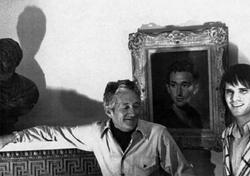
I think.
Rogers Brackett received three mentions in The Fortean Society Magazine: 10 (Autumn 1944), 11 (Winter 1944), and 14 (Spring 1946). What is striking about the first mention is not only that he included his first name, but that Thayer was so effusive for what was, in the end, a relatively mundane contribution. “Our Worshipful Brother,” Thayer called him, “Walking Delegate and Member Extraordinaire.” The slavishness suggests that Thayer knew Brackett, and that supposition, along with his unusual name, gives a clue as to the full identity of this biography.
Likely, this Rogers Brackett was born in Los Angeles on 30 September 1916. Available records suggest his father died before the 1920 census, and he and his mother Tessie (née Rogers, seemingly the source of his first name) went to live with her parents. Tessie had been born in Missouri, and her family had moved to Los Angeles by 1910. Brackett was in the Los Angeles area at the same time that Thayer was working there, and it is possible that they met, but there would have been a significant age difference, Brackett turning 20 when the 35 year-old Thayer picked up and left town.
But there were other opportunities to meet. Brackett slid back and forth between the entertainment and advertising industries, working for NBC [Broadcasting, 8 March 1943, p. 30], CBS [Broadcasting, 27 November 1944, p. 40; John Dunning, On the Air: The Encyclopedia of Old-Time Radio, 23], Grey Advertising [Don Barber, A Word from Your Local Announcer, 137], Foote, Cone and Belding, as an account executive [Donald Spoto, Rebel; the life and legend of James Dean, 87] and likely elsewhere. He commuted between New York and Santa Monica, his bases of operation, but also traveled throughout the country [Ibid., 68, 85, 88, 163, 226; “Vox Pop Cast in N.Y. to Plan New CBS-WHP Series,” Harrisburg Telegraph, 17 August 1946, 17]. In short, he moved in many of the same circles as Thayer, who also had business in Hollywood even after he left California, was in advertising, and worked with entertainers and producers.
And here comes the salacious part. In the early 1950s, Brackett met the then-struggling actor James Dean and, after a few weeks, Dean had moved into his apartment. Brackett was gay, and in love; Dean was confused, but benefitted from the relationship, Brackett introducing him to important Hollywood players getting him bit parts and radio gigs.
So Forteana connects to Hollywood gossip. Not entirely a surprise given Southern California’s bent toward mystical, Theosophical, and experimental thinking. Certainly Manly P. Hall’s biographer discusses Hollywood scandal.
But that doesn’t necessarily reflect on Brackett’s Forteanism. So, what can be said about it?
That first mention revealed a playful Fortean-outlook, interested in coincidences and word games. At the time, the Bracket who wrote Thayer was in Texas—and this certainly could have been the same Brackett who later slept with James Dean, as it was in the middle of 1944 that Brackett joined Vox Populi, a CBS show that traveled the country asking people on the street their opinions. Brackett the Fortean wrote, “It might interest you to know that I am following down the owners of a small (sic) beer hall in Austin, Texas. The sign outside proclaims Ambrose and Charlies. If I discover the last names to Bierce and Ross I shall let you know.” [sic in original].
The joke referred to one of Fort’s speculations. Noting that Ambrose Bierce, the writer, had disappeared, as had someone named Ambrose Ross [correction: Small. See Doug Skinners comment below]; Ross referred to Chrley Ross, another mysterious disapppeared.], Fort asked, “Was somebody collecting Ambroses?” But then Brackett went further, noting that some mysteriously glowing beef which had been seen in Mexia, Texas, was sent for chemical analysis to FORT Worth.
His second mention revealed more about Thayer than Brackett—assuming this Brackett is the same, since no first name is used. It concerned fourteen British scientists in Antarctica. As Thayer glossed it, “The mission began secretly, is proceeding mysteriously, and will end in confusion for poor Homo sap”—the last one of Thayer’s puny names for humanity. I have not seen the article in question—dated 24 April 1944, with no source—but it seems to have referred to Operation Tabarin, the British attempt to establish sovereignty over parts of the continent. It’s unknown what Brackett made of the story, but Thayer titled the notice “Planning ‘W W III’?,” suggesting nefarious political shenanigans.
His last contribution is particularly ambiguous. It was a clipping about a two year-old boy in San Bernardino who suffered from “poisoning and shock” after being attacked by a swarm of bees. Thayer grouped it—under the heading "bees"—with some more typically Fortean anecdotes: 100,000 bees descending upon a village and stinging 700 and a case of doctors—those foolish experts—determining a woman who died fifteen minutes after being stung passed away from pernicious anemia.
There isn’t much to say, then, about Brackett as a Fortean, at least not confidently. He had a sense of humor about the subject, and had read some Fort—but what he made of the subject, whether it was all play or there were political and scientific points to be made—these things cannot be said.
Brackett died in 1979.
[Note: The grammar on this post was especially bad, and I corrected it.]
